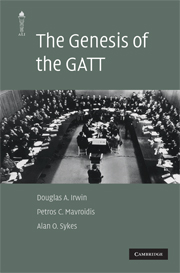3 - The Rationales for the GATT
Published online by Cambridge University Press: 12 April 2011
Summary
The two previous chapters examined the origins and evolution of the GATT as a text. In this brief chapter, we turn to the broad question of how the historical evidence relates to existing academic theories of why countries seek to negotiate and join multilateral trade agreements. The classical theory of international trade and commercial policy examines the benefits of trade and the impact of trade-policy measures, but not, until recently, the value of international trade agreements. This has prompted economists and political scientists to search for the deeper economic and political rationales for trade agreements such as the GATT. These theories seek to answer questions such as: Why do we have the GATT? What is the underlying objective of the agreement, and what purpose does it serve?
The preamble (chapeau) of the GATT sets out the major purposes of the agreement, at least in the eyes of the founders:
Recognizing that their relations in the field of trade and economic endeavour should be conducted with a view to raising standards of living, ensuring full employment and a large and steadily growing volume of real income and effective demand, developing the full use of the resources of the world and expanding the production and exchange of goods,
Being desirous of contributing to these objectives by entering into reciprocal and mutually advantageous arrangements directed to the substantial reduction of tariffs and other barriers to trade and to the elimination of discriminatory treatment in international commerce, .…
- Type
- Chapter
- Information
- The Genesis of the GATT , pp. 176 - 200Publisher: Cambridge University PressPrint publication year: 2008

